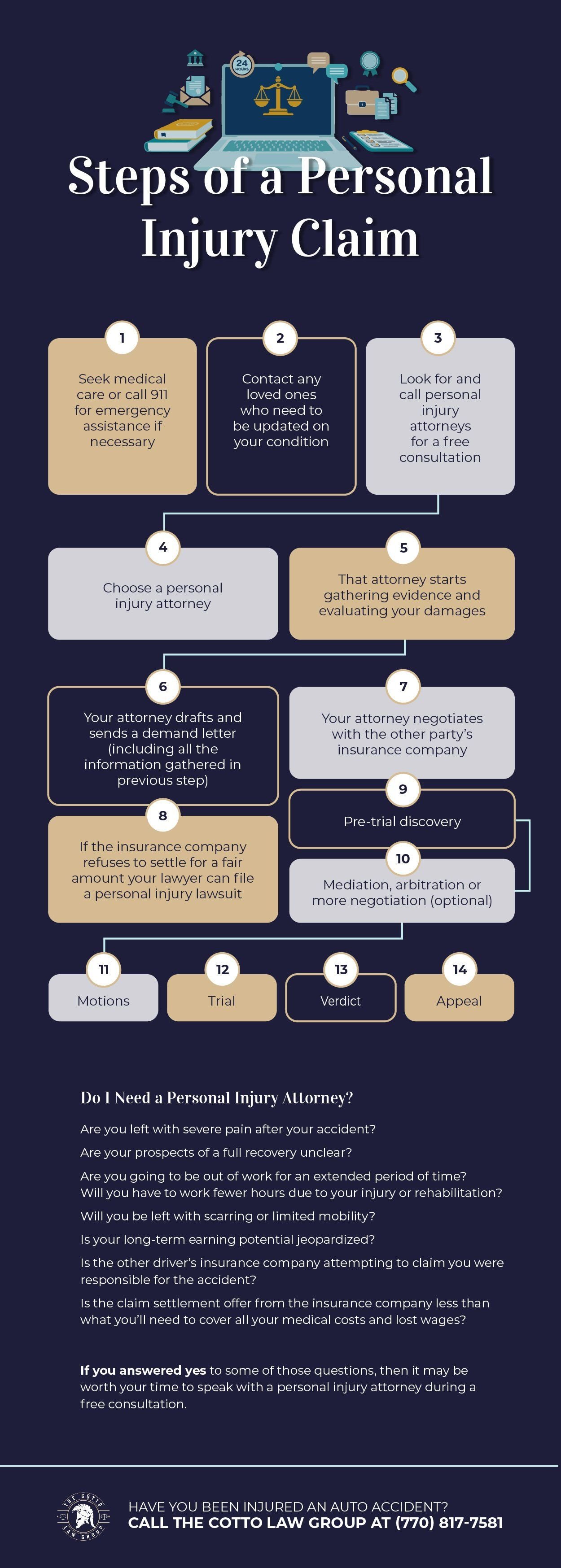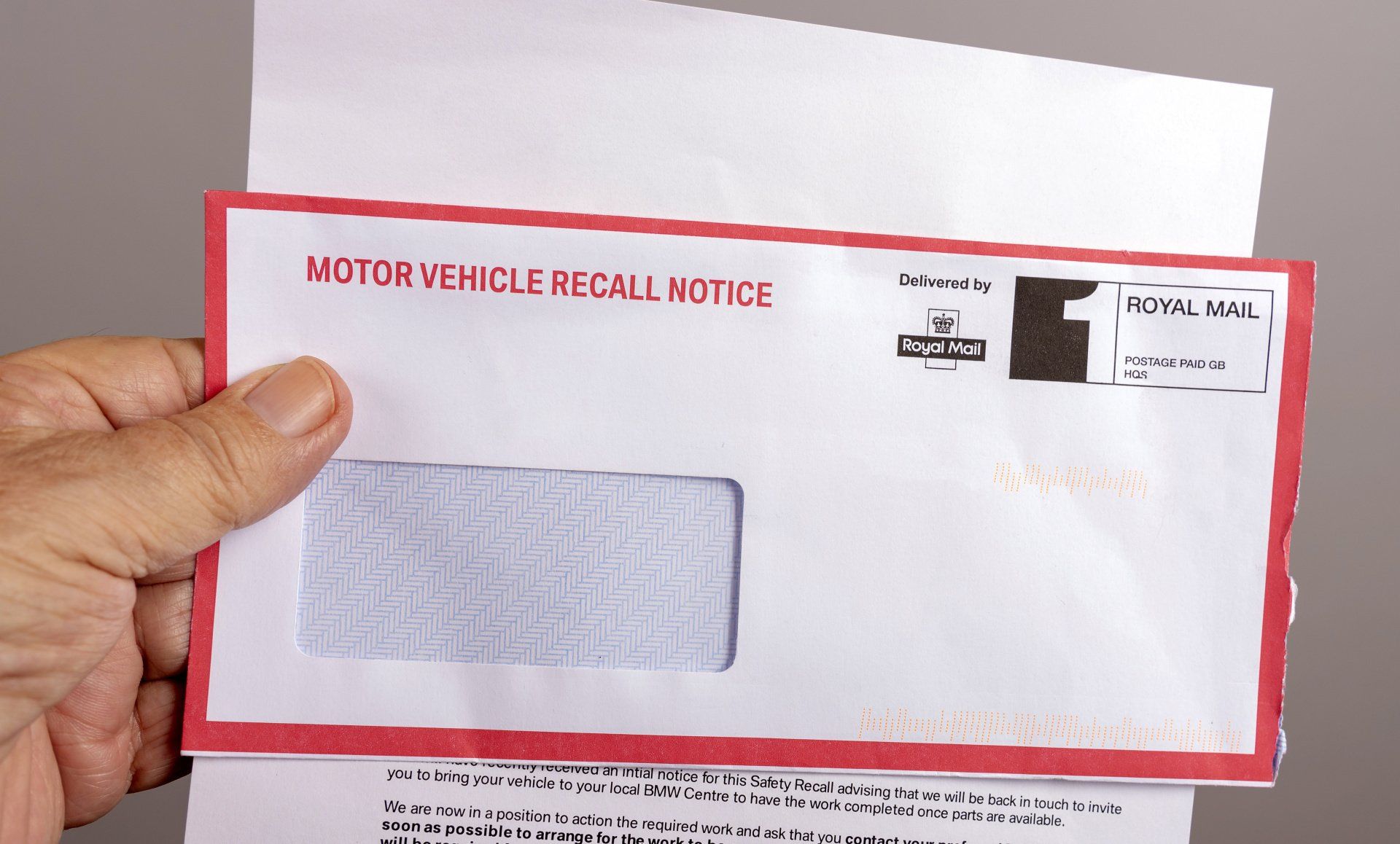What Constitutes Pain and Suffering in a Personal Injury Lawsuit?
Key Takeaways: Comprehensive Impact: "Pain and suffering" extends beyond economic losses, encompassing emotional and life quality impacts after...
Key Takeaways
Navigating a personal injury claim can be a daunting journey, but understanding the claims process is key to securing the compensation you deserve.
Personal injury claims cover damages such as medical expenses, lost wages, and pain and suffering caused by someone else's negligence.
In this article, we'll simplify the claim process, from initial steps to potential settlement or trial, and highlight the crucial role of experienced legal representation.
We'll also explore additional considerations that can impact your claim, providing a comprehensive guide to help you confidently navigate this challenging legal landscape.
Table Of Contents
Navigating the path to compensation after an injury due to negligence can feel daunting.
However, understanding the personal injury claim process can demystify the steps involved and highlight the importance of each phase in securing a successful claim.
Below is a simplified guide to provide clarity on the process.
The journey often begins with a free consultation with experienced personal injury lawyers.
This initial meeting is crucial for accident victims to understand their rights and the viability of their claims.
This step allows injured parties to discuss their case, learn about the personal injury lawsuit process, and gauge the attorney's legal expertise.
Selecting the right personal injury attorney can significantly impact the outcome of your case.
Look for lawyers with a track record of handling personal injury claims, fair settlement negotiations, and a deep understanding of personal injury laws.
The right legal professional will guide you through the complexities of the claims process, from filing personal injury lawsuits to engaging with insurance companies.
A thorough investigation to collect all relevant evidence, including police reports, medical records, and witness statements, is essential.
Experienced lawyers will evaluate your injuries, property damage, and other losses to ascertain a fair compensation amount.
This step involves understanding the full scope of the accident injuries and the fault of the negligent party, which will form the basis for the ensuing legal action.
After building a strong case, your personal injury attorney will send a demand package to the fault party's insurance company.
This package includes all evidence of negligence and a detailed account of the damages suffered.
Settlement negotiations then begin, aiming for fair compensation without proceeding to trial.
Effective negotiation strategies are crucial here to ensure maximum compensation for the injured party.
If negotiations don't result in an acceptable settlement, the next step is to file a personal injury lawsuit.
This marks the beginning of the litigation process, which includes pre-trial motions, a discovery phase (where both sides exchange evidence and information), and possibly mediation to attempt a settlement before trial.
Should mediation fail, the case proceeds to trial, where evidence is presented before a judge or jury.
The legal expertise of your personal injury lawyer is paramount in this phase.
Following a jury verdict, an appeals process may occur if either party contests the decision.
Each step in the personal injury claim process plays a vital role in the pursuit of justice and fair compensation for accident victims.
From the initial consultation to potential appeals, understanding and navigating these phases with the help of an experienced personal injury attorney can make all the difference in achieving a favorable outcome.

Personal injury claims are legal disputes that arise when one person suffers harm from an accident, and someone else might be legally responsible for that harm.
These claims cover a wide variety of accidents, including auto accidents, slip and falls, and workplace accidents.
In personal injury cases, the crucial issue revolves around fault and liability.
Determining fault involves understanding who acted negligently or failed to act in a way that would prevent harm.
Liability is about who is legally responsible for compensating the injured party.
This compensation can cover everything from medical bills and property damage to emotional distress and loss of earnings.
Establishing fault and liability is crucial because it directly influences the success of a personal injury claim, guiding the injured toward securing the financial recovery they rightfully deserve.
Immediately following an injury, taking immediate and strategic steps is vital for your health and any subsequent legal claims.
Here are the essential actions to consider:
Taking these steps promptly can enhance your chances of securing fair compensation for your injuries and losses.
Navigating the insurance problem in personal injury cases often feels like a maze.
Understanding coverage is the first step; knowing what your policy or the at-fault party's insurance covers is crucial.
Disputing fault becomes necessary when insurance companies attempt to minimize their payout by shifting blame.
In such scenarios, legal assistance is not just beneficial but crucial.
A skilled personal injury lawyer can advocate on your behalf, ensuring that the insurance claim accurately reflects the extent of your injuries and losses.
They can also handle the back-and-forth negotiation with insurance carriers, aiming for a settlement that compensates for your damages.
Several key considerations can impact the outcome of your claim.
The statute of limitations limits how long you have to file a lawsuit, making timely action essential.
Medical and expert witnesses are pivotal in substantiating your injuries and the extent of your damages, providing critical evidence to support your case.
The discovery process allows both sides to gather information and build their arguments, highlighting the importance of thorough preparation.
Additionally, emotional distress is a significant factor in personal injury claims, as it can contribute to the overall calculation of damages.
Understanding and addressing these considerations is crucial in pursuing a successful personal injury claim.

Achieving fair compensation in personal injury cases is a nuanced process that requires strategic negotiation skills and a deep understanding of legal precedents.
Experienced legal representation is key, as seasoned personal injury lawyers bring a wealth of knowledge and negotiation expertise to the table.
They can effectively argue for a settlement that covers medical expenses and property damage and accounts for emotional distress and lost wages.
By leveraging their experience in similar cases and understanding of insurance company tactics, they can push for a settlement that reflects the extent of your injuries and losses.
This expertise is invaluable in securing the financial recovery necessary to move forward after an accident.
Deciding when to hire a personal injury lawyer is pivotal in navigating the aftermath of an accident.
If you sustained severe injuries, face disputes with insurance companies, or encounter complex liability issues, seeking legal expertise ASAP becomes essential.
A personal injury attorney adept at handling such disputes can effectively counter insurance company strategies, ensuring your rights are protected.
They play an integral role in guiding injured parties through legal complexities, like filing personal injury claims and negotiating fair settlements, to ensure fair compensation.
At the Cotto Law Group, our dedication to guiding clients through the complexities of personal injury claims is unwavering.
Our deep understanding of personal injury law and a proven track record of protecting our client's financial interests set us apart.
We are committed to securing the compensation you deserve, whether through negotiations with insurance companies or representation in court.
Choosing a firm with our level of expertise ensures that your rights are safeguarded every step of the way.
We invite you to contact us for a free, no-obligation consultation to discuss your potential personal injury case and how we can assist you in your journey to recovery.


Key Takeaways: Comprehensive Impact: "Pain and suffering" extends beyond economic losses, encompassing emotional and life quality impacts after...

Key Takeaways: Recall Responsibility: Vehicle owners need to act promptly on recall notices to minimize their liability in accidents involving...

Key Takeaways: Always maintain extra space and stay alert to motorcycles, especially in blind spots and during lane changes, to ensure safety on the...